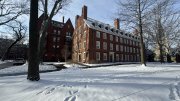On January 31, President Alan M. Garber announced the inaugural members of his University Faculty Advisory Council, a two-year experiment announced last November as a means of bringing faculty views to bear on Harvard-wide issues. The council will meet with the president, provost, and Academic Council (deans and vice presidents), “helping to inform our decision-making processes and bringing diverse faculty perspectives to our deliberations,” Garber wrote last Friday when unveiling the 16 members of the Council during its initial trial period. They are:
Martin Bechthold, Kumagai professor of architectural technology and academic dean, Graduate School of Design
Iris Bohnet, Pratt professor of business and government, Harvard Kennedy School
Jorge Chavarro, professor of nutrition and epidemiology, Harvard T.H. Chan School of Public Health (HSPH), and professor of medicine, Harvard Medical School (HMS)
Stephen Chong, McKay professor of computer science, Harvard John A. Paulson School of Engineering and Applied Sciences (SEAS), and Faculty Dean, Winthrop House
Sandeep Robert Datta, professor of neurobiology, HMS
Annette Gordon-Reed, Loeb University Professor
Catherine Hayes, member of the faculty of oral health policy and epidemiology, Harvard School of Dental Medicine
Robert Huckman, Weatherhead professor of business, Harvard Business School
Tracey Hucks, Thomas professor of Africana religious studies, Harvard Divinity School
Stephanie Jones, professor in early childhood development, Harvard Graduate School of Education
Elizabeth Papp Kamali, Scott professor of law, Harvard Law School
Robert Kingston, professor of genetics, Harvard Medical School, and chief academic officer, Massachusetts General Hospital
Matthew Nock, Pierce professor of psychology, Faculty of Arts and Sciences (FAS), and professor in the department of epidemiology, HSPH
Karin Öberg, Cabot professor of the natural sciences, FAS
Gina Schouten, professor of philosophy, FAS
Fernanda Viégas, McKay professor of computer science, SEAS
The council may be useful at a time when the University is rapidly developing policies on matters such as institutional neutrality and civil discourse and free speech (and associated regulations governing protests)—and, in reaching settlements, with policy implications, of lawsuits and government investigations, detailing its anti-discrimination and -harassment policies as they apply to antisemitic and anti-Arab, -Muslim, and -Palestinian speech and behavior: all matters of great concern to the faculties.
At the same time, the council may be useful in staving off an effort arising directly from the faculties, most of which have now voted to join a planning group to consider creating a formal faculty senate to address University policies and concerns. (Harvard Medical School decided to proceed via a process involving preclinical department chairs and its faculty council, rather than by a vote of its professors. At this point, only the Harvard Business School faculty has taken no action on joining the planning deliberations, which formally began in December and ramp up this week.)
As the University and its peers come under severe pressure from the policy and budget decisions emanating from the new administration in Washington, expect faculty members’ concerns about the scope of their teaching and research, and the availability of external funds supporting the latter, to intensify—further fueling the desire to have a voice in shaping Harvard’s responses.








